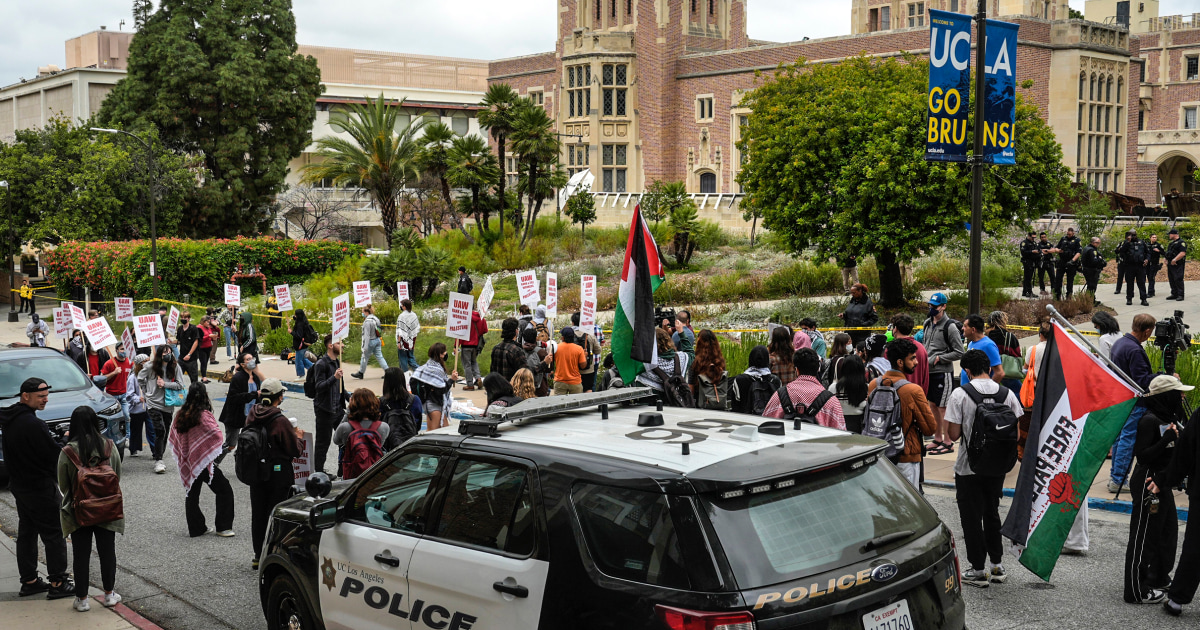
LOS ANGELES — Dueling lawsuits against UCLA each describe a rise in antisemitic and anti-Palestinian bias since protests erupted on campus last year over the Israel-Hamas war.
A lawsuit filed Tuesday by the American Civil Liberties Union of Southern California says UCLA and the University of California Board of Regents, which oversees the UC system, suppressed antiwar voices and ordered students and faculty protesters arrested unlawfully.
A separate lawsuit alleging UCLA failed to stop antisemitism in a so-called Jewish exclusion zone protest area, which was originally filed in June, was amended Tuesday to include details about how the plaintiffs, three students and a professor, were personally affected by the demonstrations.
Sometimes violent protests and counterprotests roiled the campus last spring as the war in Gaza dragged on after it erupted on Oct. 7, 2023.
The protests put college administrators on a tightrope as they tried to balance free speech protections with mandates to provide a safe learning environment for thousands of students.
The ACLU complaint seeks to have protesters’ disciplinary records expunged and to prevent academic discipline against those protesting in the future. It also calls for an injunction that would bar UCLA from giving orders to disperse based solely on suspected breaches of university policies, which the lawsuit says unfairly target pro-Palestinian voices.
“Students decrying the genocide of Palestinians and the university’s complicity were brutally shut down by the same administrators who profess to support free expression and thinking,” said one of the plaintiffs, Graeme Blair, an associate professor of political science, who was arrested during a May 2 protest.
“As an educator, I am ashamed that the university failed our students,” he added in a statement.
In the amended complaint, Jewish plaintiffs said campus police blocked them from passing through the zone and prohibited them from entering the pro-Palestinian encampment despite the school’s policy of not tolerating discrimination on the basis of race, color, ethnicity, citizenship or religious beliefs.
“UCLA has failed to provide Jewish students, faculty, and staff with the protection promised by such policies,” the amended complaint says. “Jews should not fear for their safety when they walk around any public space, let alone the campus of a prominent American research university.”
In an emailed statement, UCLA said it “fully supports community members expressing their First Amendment rights in ways that do not violate the law or our policies, jeopardize community safety, or disrupt the functioning of the university.”
“The encampment that arose on campus this Spring became a focal point for violence, a disruption to campus, and was in violation of the law,” the statement continued. “These conditions necessitated its removal.”
Both complaints refer to task forces UCLA established to examine antisemitism and Islamophobia on campus. The antisemitism report was released this month, and the one on anti-Palestinian and anti-Muslim bias came out in May.
The latter said students and faculty members protesting the war in Gaza faced tighter free speech restrictions than pro-Israel demonstrators and were targets of repeated and unchecked violent attacks by counterprotesters.
The antisemitism report found that more than 40% of respondents said they considered leaving UCLA because of anti-Jewish and anti-Israeli bias and that 75% said antisemitism was not treated with the same gravity as other forms of discrimination.
More than 100 Jewish or Israeli American students and faculty and staff members said they were attacked or threatened because of their identities.
“The University must prevent discrimination against Jewish and Israeli community members, implement new state legislation, and rapidly address the work environment concerns for faculty, staff, and students, in order to mitigate adverse consequences to the University,” the report said.
The Los Angeles campus became a hotbed of protest and counterprotest activity throughout much of the spring semester. Violent skirmishes broke out between the two factions and between protesters and law enforcement officers.
Police in riot gear shut down encampments and fired nonlethal projectiles into crowds. Some protests were interrupted by fireworks counterprotesters threw into the pro-Palestinian encampment.
The university came under fire for failing to control tensions. Some pro-Israel students and faculty members said they did not feel safe walking to classes, and pro-Palestinian protesters said they were increasingly subjected to violence and suppression.
Tensions have continued into the new academic year, and they escalated when at least one person was arrested Monday during a protest. The demonstration by about 40 people, according to UCLA police, was small compared with the protests in the spring, when hundreds of people amassed on campus.